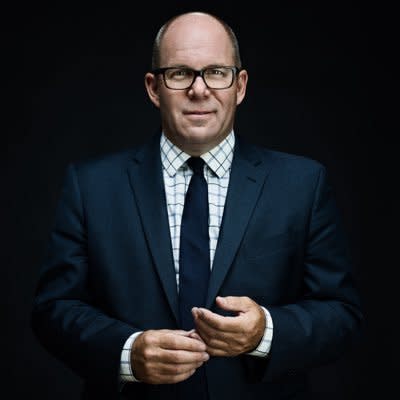Cannabis CEO pleads for Ottawa to shut down booming black market

The chief executive of OrganiGram Holdings Inc. (OGI.V) is calling on Ottawa to live up to its promise to snuff out the booming illegal cannabis market commanding the lion’s share of sales.
Greg Engel said he and his fellow licensed producers are facing “huge challenges” in luring buyers away from black market sellers offering prohibited perks like same-day courier delivery, free samples, and vibrant packaging, as well as a suite of cannabis-infused beverages and snacks ahead of pending legalization of those products.
“Our understanding is that for those illicit sources, business has never been better,” he told Yahoo Finance Canada in an interview. “We continue to hear stories about online or same-day delivery people in major cities in Canada going around and giving out free product with their website address and phone number. They are doing things that we would never do.”
Canadian households spent $5.9 billion on cannabis in the fourth quarter, according to Statistics Canada. The federal agency found $4.7 billion of that figure was spent outside the legal system.
Engel said while recreational legalization has drummed up unprecedented interest in cannabis and eroded long-held stigma, it has also prompted more Canadians to feel comfortable buying from illegal sources.
“They just see cannabis as legal,” he said.
Engel said the industry is concerned about the enduring strength of the black market, and perceived inaction from Ottawa. It’s a frustrating situation, he said, since depriving criminals of cannabis profits was a major part of the government’s case for fully legalizing the drug.
“One of the things that is disappointing to OrganiGram, and the industry in general, is the lack of enforcement we’ve seen against illicit supply. In particular, the kind of online and retails stores that are operating in an unlicensed fashion,” Engel said. “Occasionally you will see a story in the newspaper that there was a store closed. But you can go on your computer right now and find 50 sites that will ship you products overnight.”
Indeed, there is no shortage of websites offering that. TPD Express, for example, promises to deliver high-grade cannabis via courier to customers in the Greater Toronto Area.
Doob2Door offers a similar service. The company’s website says it has been servicing Toronto residents since 2015. It even has plans to introduce a points-based reward system.
Currently, the only legal cannabis source in Ontario is the province-run Ontario Cannabis Store website.
Lower prices aren’t the only advantage the black market has, but the deep discounts are a significant headwind for legal sales.
StatCan said the average all-in market price paid for legal dried flower was $9.70 per gram in the fourth quarter of 2018. The average price of for illegal cannabis was $6.51 per gram, 32.9 per cent lower.
Legal retailers are fighting an uphill battle when it comes to pleasing customers, according to Nick Pateras, vice president of strategy at the cannabis data firm Lift & Co. He said black market cannabis is typically high-quality, and 40 to 60 per cent of illegal sales are products like vape pens, concentrates, and edibles that have yet to be incorporated into Canada’s legal framework.
With provincial governments acting as middlemen wholesalers, a limited roll-out of brick-and-mortar stores planned for major markets like Ontario, taxes, fewer products, strict Health Canada standards, and supply issues at many of the largest licensed producers, legal cannabis is fighting a far more agile outlaw rival.
For Engel, the answer is calling for backup from police and the financial services sector.
“Go after online sales in conjunction with Moneris and credit card companies. Or go after the criminal black market retail locations by banks targeting the landlords who own those buildings,” he said. “What we as an industry, and OrganiGram, would like to see is additional resources put against that part of enforcement.”
Toronto-based cannabis defence lawyer Paul Lewin is not convinced targeting online payments and owners of rented space to stamp out illegal sales will have a positive effect.
“That's an absolutely knuckle-headed idea,” he told Yahoo Finance Canada. “Pushing it further underground is going to make it less safe. I think the answer is improve the system. Improve the products and bring in the black market.”
Pateras also sees bringing illegal operators under the legal umbrella as the path of least resistance. More legal workers would be also be a win for his employer, Lift & Co., the sole provider of mandatory cannabis retail training in Ontario, as well as cannabis certifications in Nova Scotia and Prince Edward Island.
“Right now we are hearing from a lot of operators that they want to go legal, but they find the costs unbelievable prohibitive. The red tape is intimidating and frankly they are not actually sure if they can sustain themselves in the new environment,” he said.
Engel said the federal government has a responsibility to safeguard the legal market from illegal competition, especially given its new oversight of the industry under the Cannabis Act.
Pateras warns Organigram and its peers should expect years of illegal competition if the cannabis landscape in Colorado is an indication of what’s to come.
“Colorado just surpassed its fifth anniversary of legal sales, and the estimates are that 20 to 30 per cent of its overall cannabis economy is still underground,” he said. “It’s still got a black market that is a sizeable portion.”
Download the Yahoo Finance app, available for Apple and Android.


 Yahoo Finance
Yahoo Finance 
